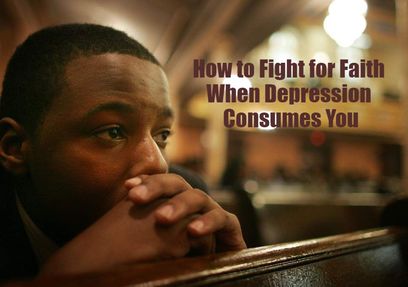
The Least Preached Subject
David Murray
In a church of 100 people, 20 people will likely experience depression or an anxiety disorder at some stage in their life. If you are in a church of that size, there are probably 5-10 people struggling with depression right now. If you add in the family, friends, and employers of sufferers, something approaching 25% of an average congregation will be impacted to some degree. Depression is the leading cause of disability in the US among people aged 15-44, with suicide being the second leading cause of death in the same age group.
But when was the last time you preached or heard a sermon on depression, or any mental health issue for that matter? Given its prevalence, why is it so rarely even mentioned?
Rare Preaching
One reason is that there is so much ignorance and misunderstanding around mental health issues. Many pastors simply do not feel equipped to address the subject. Their seminaries did not train them and they have not pursued further training to help them understand and minister to people with such problems.
Many pastors are also unaware of just how common the problem is. Perhaps fearing a lack of sympathy or understanding, Christians with depression will often seek help from outside the church. The result is that there can be many depressed people in a church but the pastor does not know about it.
Other pastors may have decided that it’s entirely a medical problem and therefore something to be left to the medical profession. For these and other reasons, depression is rarely addressed in sermons and the effect is that depressed people feel isolated and ignored, exacerbating the problem.
Damaging Preaching
But even worse than neglecting the subject is insensitive preaching that unintentionally makes the suffering even worse. From counseling depressed Christians, I’ve discovered that these types of sermon actually harm more than help:
– Sermons that over-stress the moral evils of the day. They are anxious enough through hearing the daily news without every church service ramping up the “we’re doomed” rhetoric. A steady diet of gloomy sermons, or graphic descriptions of violence, persecution, and other moral evils, is not going to lift up the head or heart of the cast down.
– Sermons that extol constant happiness as the only valid and virtuous Christian experience. The deep pain of depression is multiplied when a depressed person is repeatedly told that all sadness is a sin.
– Sermons that question the faith of anyone who doubts. A lack of assurance is not necessarily a lack of faith. Believers who hang on to God despite feeling no assurance sometimes have the greatest faith.
– Sermons that demand, demand, and demand. The depressed person already feels like an inadequate failure. To be regularly berated for not doing this ministry, or failing to engage in that Christian service, only crushes what’s left of their spirit.
I’m not suggesting that these themes should never be preached but I am calling preachers for greater sensitivity towards the depressed and anxious in their sermons.
 Photo credit: allchristiannews.com
Photo credit: allchristiannews.com
If that’s what harms, what kind of sermons can help depressed people? One of the simplest and best things a preacher can do is preach sermons that at least mention depression, anxiety, and other mental and emotional disorders. Just to have such suffering publicly acknowledged can minister deeply to sufferers. It can help them to come out of the shadows and into the open, to sense that this is a safe place to share, and to believe that it’s okay not to be okay. It can also be helpful for the preacher to mention statistics that show how common the problem is, how this is a normal abnormality in an abnormal world.
The preacher may also demonstrate from the Bible that true believers often suffer with depression (e.g. Elijah, Jeremiah, David, Job). The Psalms are an excellent vehicle for showing believers the dark depths that believers can fall into
Psalm 88:1-18 (NKJV) 1 O LORD, God of my salvation, I have cried out day and night before You.2 Let my prayer come before You; Incline Your ear to my cry.3 For my soul is full of troubles, And my life draws near to the grave.4 I am counted with those who go down to the pit; I am like a man who has no strength,5 Adrift among the dead, Like the slain who lie in the grave, Whom You remember no more, And who are cut off from Your hand.6 You have laid me in the lowest pit, In darkness, in the depths.7 Your wrath lies heavy upon me, And You have afflicted me with all Your waves. Selah
8 You have put away my acquaintances far from me; You have made me an abomination to them; I am shut up, and I cannot get out;9 My eye wastes away because of affliction. LORD, I have called daily upon You; I have stretched out my hands to You.10 Will You work wonders for the dead? Shall the dead arise and praise You? Selah
11 Shall Your lovingkindness be declared in the grave? Or Your faithfulness in the place of destruction?12 Shall Your wonders be known in the dark? And Your righteousness in the land of forgetfulness?13 But to You I have cried out, O LORD, And in the morning my prayer comes before You.14 LORD, why do You cast off my soul? Why do You hide Your face from me?15 I have been afflicted and ready to die from my youth; I suffer Your terrors; I am distraught.16 Your fierce wrath has gone over me; Your terrors have cut me off.17 They came around me all day long like water; They engulfed me altogether.
18 Loved one and friend You have put far from me, And my acquaintances into darkness.
And also give hope of recovery showing that there is a way out.
Psalm 77:1-20 (NKJV) 1 I cried out to God with my voice-- To God with my voice; And He gave ear to me.2 In the day of my trouble I sought the Lord; My hand was stretched out in the night without ceasing; My soul refused to be comforted.3 I remembered God, and was troubled; I complained, and my spirit was overwhelmed. Selah
4 You hold my eyelids open; I am so troubled that I cannot speak.5 I have considered the days of old, The years of ancient times.6 I call to remembrance my song in the night; I meditate within my heart, And my spirit makes diligent search.7 Will the Lord cast off forever? And will He be favorable no more?8 Has His mercy ceased forever? Has His promise failed forevermore?9 Has God forgotten to be gracious? Has He in anger shut up His tender mercies? Selah
10 And I said, "This is my anguish; But I will remember the years of the right hand of the Most High."11 I will remember the works of the LORD; Surely I will remember Your wonders of old.12 I will also meditate on all Your work, And talk of Your deeds.13 Your way, O God, is in the sanctuary; Who is so great a God as our God?14 You are the God who does wonders; You have declared Your strength among the peoples.15 You have with Your arm redeemed Your people, The sons of Jacob and Joseph. Selah
16 The waters saw You, O God; The waters saw You, they were afraid; The depths also trembled.17 The clouds poured out water; The skies sent out a sound; Your arrows also flashed about.18 The voice of Your thunder was in the whirlwind; The lightnings lit up the world; The earth trembled and shook.19 Your way was in the sea, Your path in the great waters, And Your footsteps were not known.20 You led Your people like a flock By the hand of Moses and Aaron.
Sermons on Job should not just focus on the passages of triumph but also the passages of despair. Idealism must be tempered with realism. Other examples from throughout church history might also be added. For example, even the great Baptist preacher Charles Spurgeon endured long periods of depression.
Sermons should also promote a holistic approach to mental health struggles. It’s very easy for preachers to take a simplistic approach – it’s all physical, or it’s all spiritual, or it’s all cognitive, etc. However, it’s very rarely that simple. There’s usually a complex mix of issues – the physical, the situational, the relational, the financial, the spiritual, the emotional, the mental, etc. This is true not just in terms of tracing causes but also in suggesting cures. One size does not fit all. Those relying on just meds should be encouraged to explore other dimensions of the problem. Same with those who are fixated exclusively on finding a sin to repent of.
Preachers with a tendency to preach on the more subjective side of Christian life should remember that depressed people need to focus most on the objective facts of Christianity, the historic doctrines of the faith. Facts first and feelings follow. There’s a place for careful self-examination, but remember Robert Murray McCheyne’s rule: “For every look inside, take ten looks to Christ.”
And that really brings me to the best way to preach to the depressed, and that’s to preach Christ. Preach his suffering and sympathizing humanity. Preach his gentle and tender dealings with trembling and timid sinners. Preach his gracious and merciful words. Preach his beautiful meekness. Preach his miracles to demonstrate his power to heal. Preach his finished work on Calvary. Preach his offer of rest to the weary. Preach the power of his resurrection-life. Preach his precious promise: “A bruised reed he will not break, and smoking flax he will not quench” (Isa. 42:3)
Preach Christ! Preach him winningly and winsomely. Preach him near and ready to help. Preach him from the heart to the heart. Preach him again, and again, and again. Until the day dawn and the shadows flee away.

 RSS Feed
RSS Feed